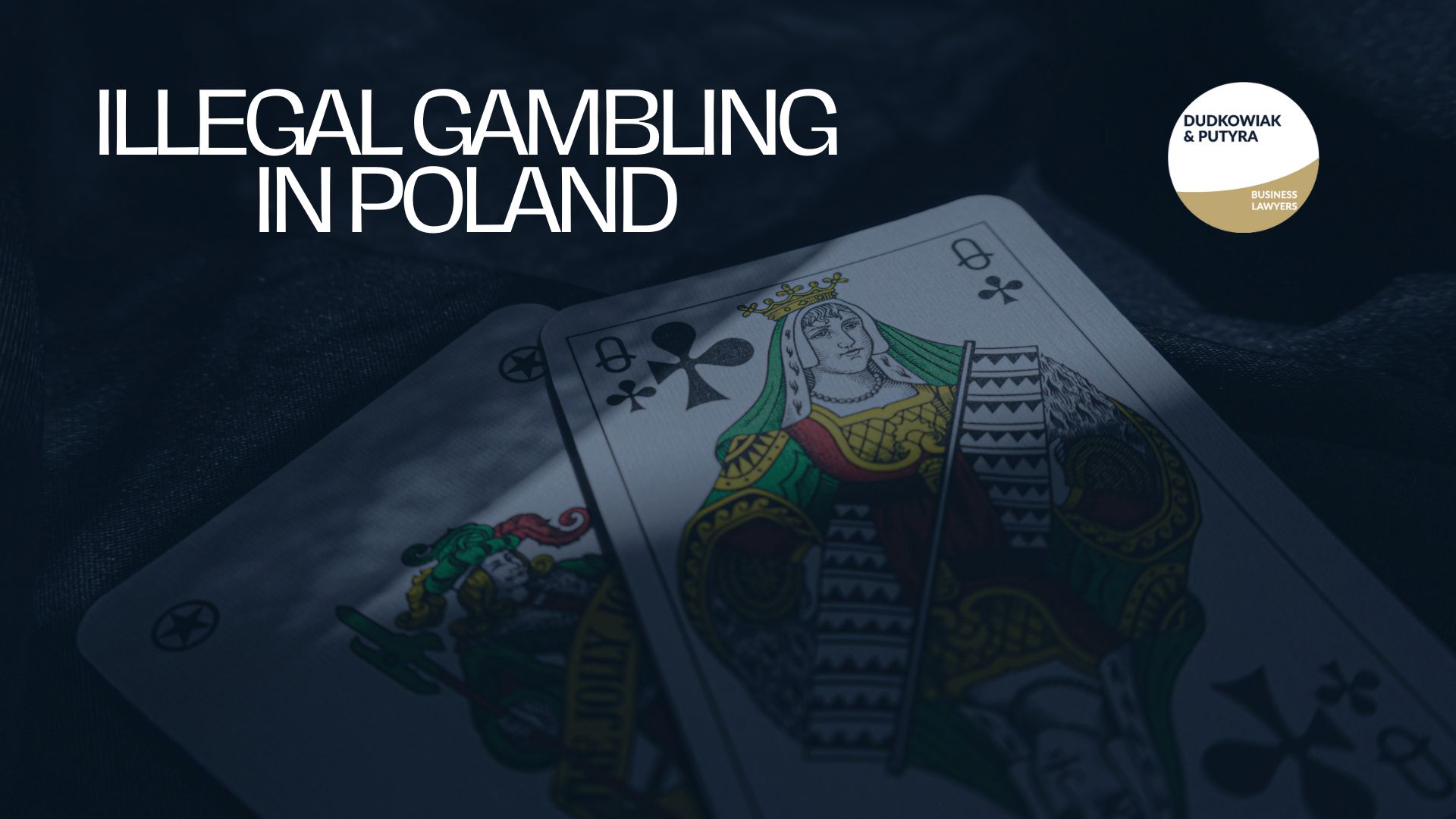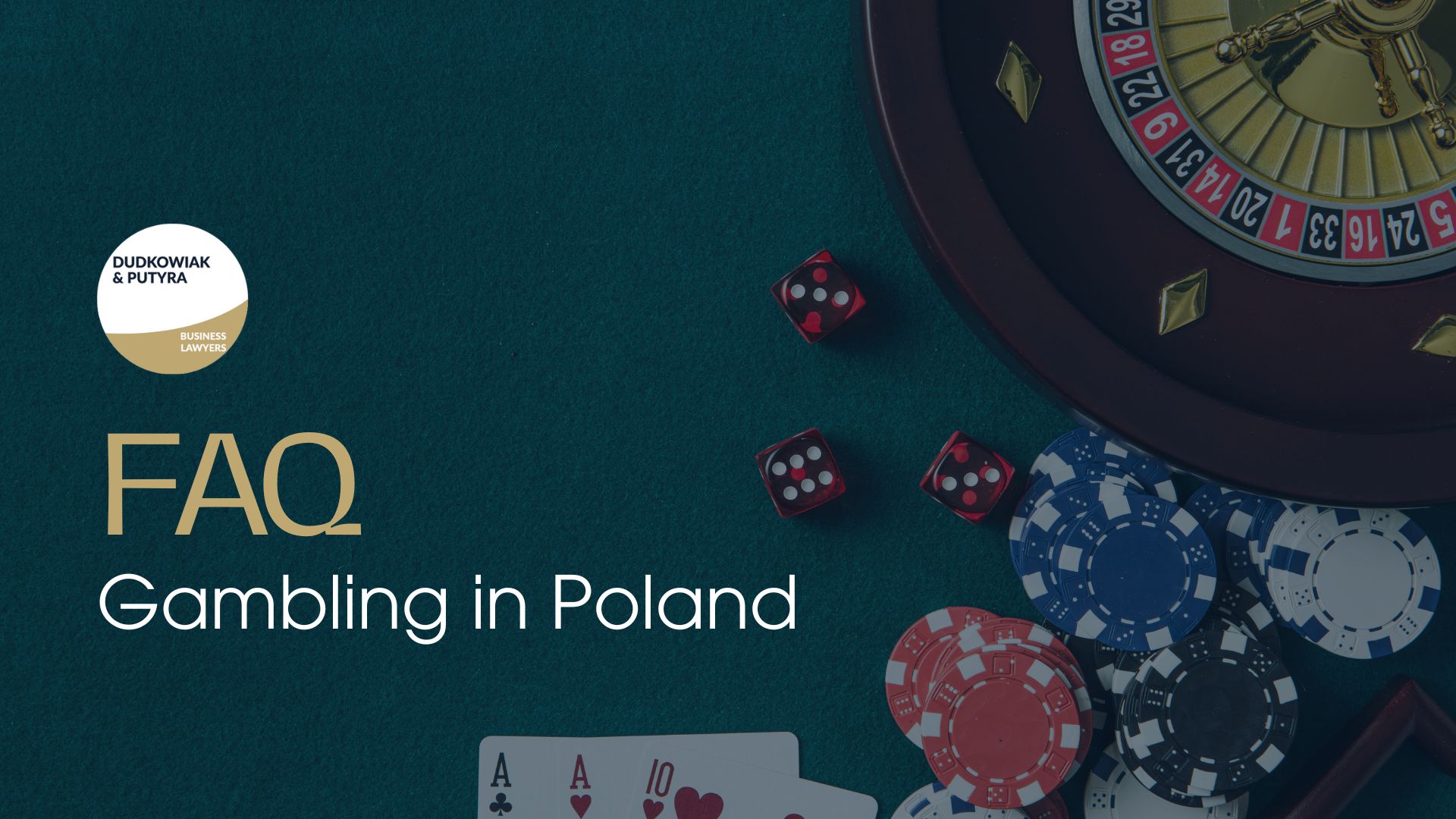Last updated: 10.11.2025
Gambling Law in Poland – Criminal aspect
Criminal aspects related to gambling vary from jurisdiction to jurisdiction, but in Poland gambling is strictly regulated by law.
Criminal liability issues related to, among other things, the arrangement, promotion of gambling and participation in gambling operations are regulated primarily by the Polish Gambling Act of November 19, 2009. (hereinafter: the “Act”) and the Fiscal Penal Code (hereinafter: the “Fiscal Penal Code”).
Oversight is conducted by the Ministry of Finance and the National Revenue Administration, which also plays a role in enforcing penalties and counteracting money laundering risks connected to illegal gambling operations.
This article introduces the key criminal aspects of the Polish gambling sector, particularly regarding online gambling activities and the consequences for individuals and gambling operators.
What is a gambling game?
The term “gambling game” includes in its scope all games where winning or losing depends not on the skill of the players, but solely on fate. These are not considered skill games, as outcomes are driven entirely by chance.
The characteristic feature that distinguishes a gambling game from a non-gambling game is that in a gambling game the winning depends on the so-called “accident of chance”, which is independent of the participants in the game.
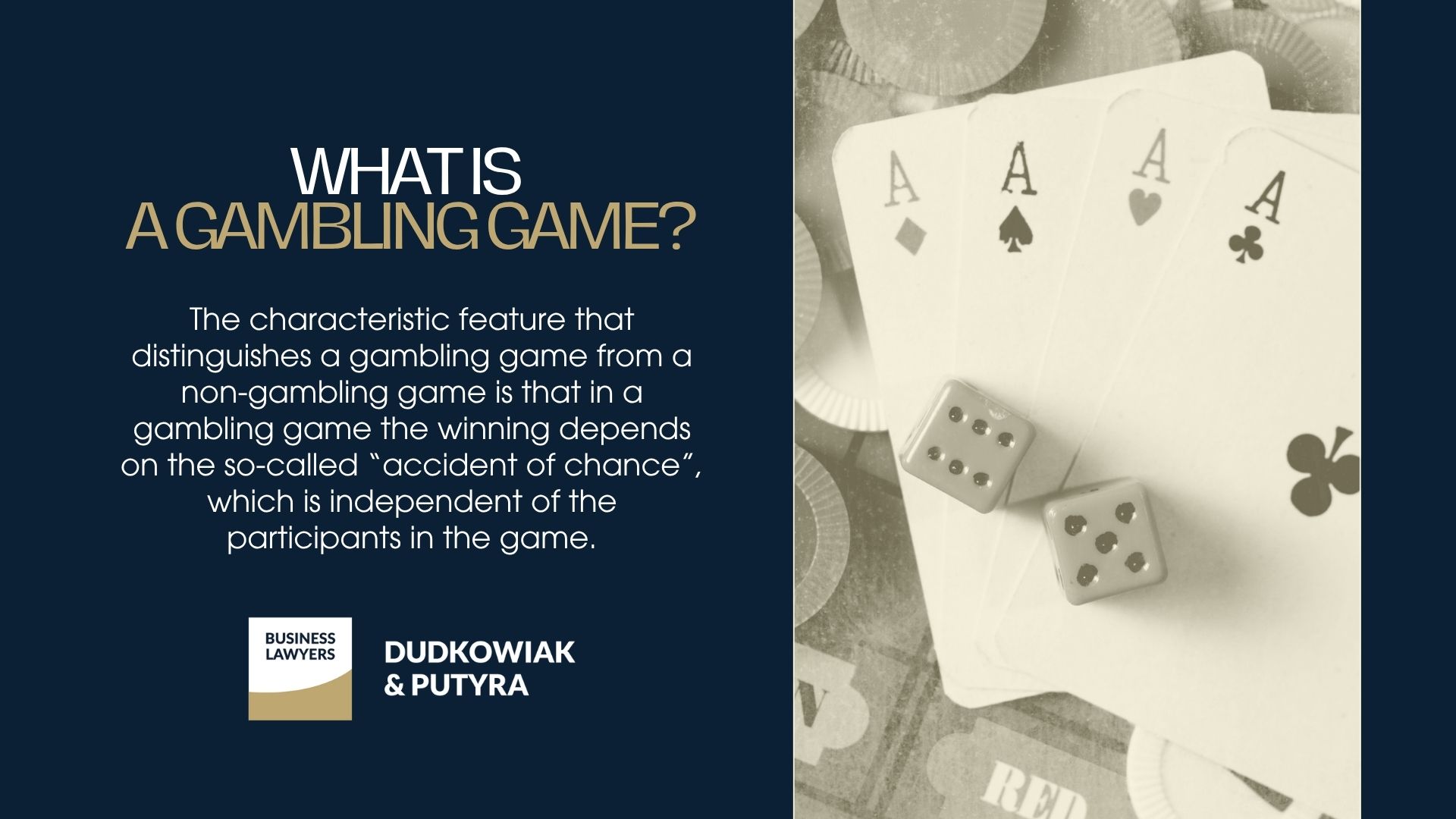
The second element is that in a gambling game one can gain or lose a thing, not necessarily just money. It is a game for money or for other material goods understood very broadly.
By way of example, the mere possibility of continuing to play without having to continue to put in money, or obtaining, as part of the game and winning, items of equipment used to play, such as additional skins, which may not actually have any market value at all, are nevertheless considered a material prize.
Thus, the key elements for gambling are chance and a material prize.
Article 2 of the Law contains a statutory catalog of gambling games, which are the following games organised as games of chance:
- number games
- cash lotteries
- telebingo games
- cylinder games
- dice games
- cash bingo game
- fantasy bingo game
- raffle lotteries
- promotional lotteries
- audiotex lotteries
In case of doubts about the nature of the game, an evaluation and decision can be requested from the Minister of Public Finance to resolve the possible gambling nature of the game.
Our specialists can also evaluate and analyze the content of websites and online games for their possible gambling nature.
What is online gambling?
Currently, alongside traditional gambling, e-gambling conducted online is also extremely popular.
According to Articles 1 and 2 of the Act, it can be assumed that online gambling is games of chance, sports betting, card games (mainly black jack, poker, baccarat) and automatic machine games arranged over the Internet.
Online gambling also includes two key elements: material winnings and chance.
Online gambling services also include any service that involves wagering on stakes with monetary value in games of chance, including lotteries and pari-mutuel betting.
Pari-mutual bets include bets on winnings in cash or in kind, involving guessing, among other things, the results of sports competition between humans or animals, in which participants pay stakes and the amount of winnings depends on the total amount of stakes paid.
It should be pointed out that organizers of illegal online gambling are subject to the same sanctions as for traditional gambling.
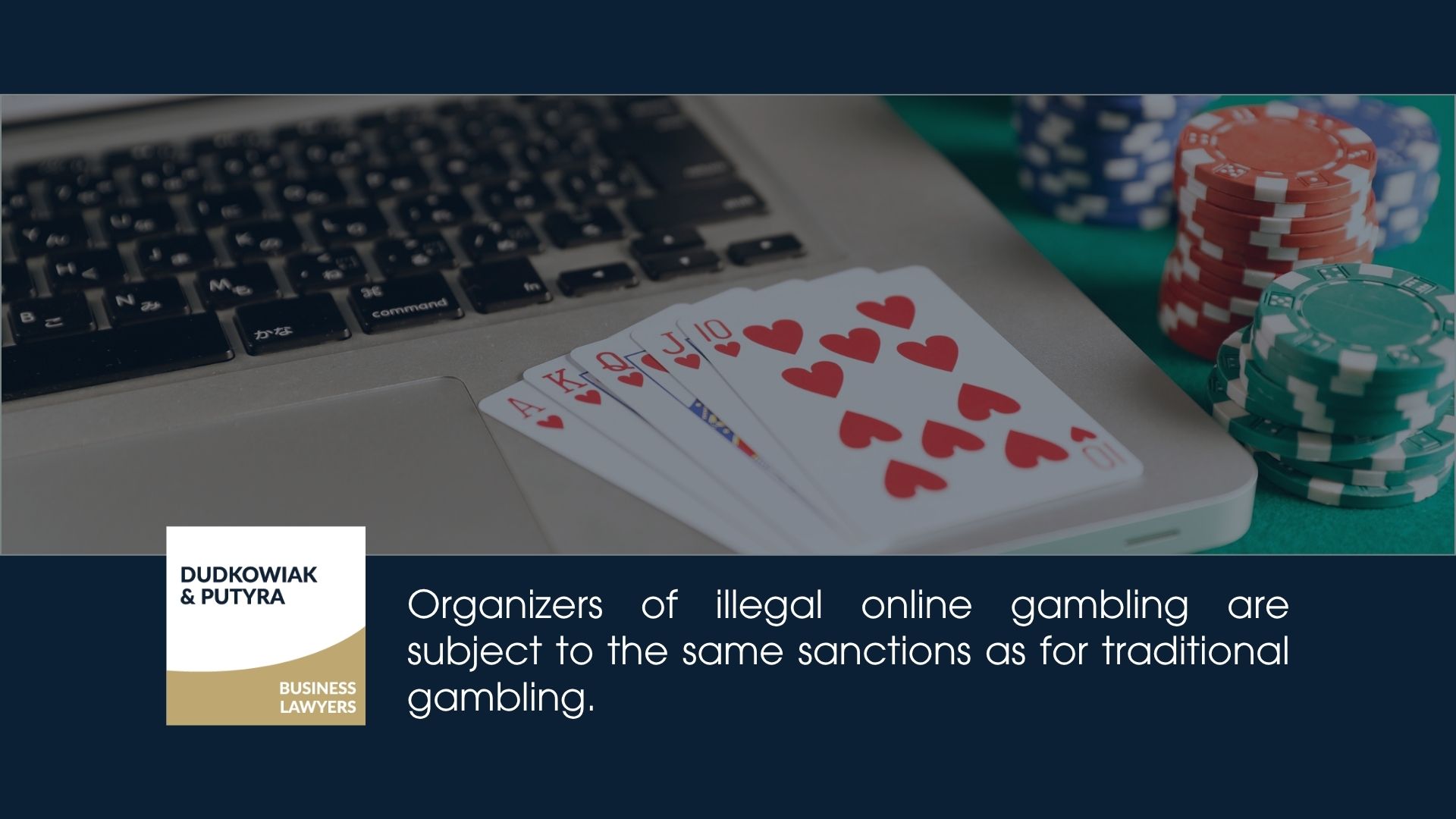
Where to Find the Registry of Banned Gambling Domains in Poland?
Websites of organizers of illegal gambling are blocked by state authorities (the so-called banned domain registry).
The domain registry is maintained online and is available here: https://hazard.mf.gov.pl/
The registry includes not only Polish sites, but also any foreign domains, if Polish state authorities assess that they are available – possible to open in Poland and contain gambling content without proper authorization.
Domain blocking is most often sudden and is not preceded by any summons or issuance of a decision.
If your domain has been included in the register of banned domains, remember that there are possible measures to take in order to remove the domain from the register, including, among others, filing an objection to the Minister of Finance.
Our lawyers have experience in this area and will help bring you closer to the operation of the registry, including challenging domain entries in the registry.
What is the penalty for illegally arranging or conducting gambling activities in Poland?
The fiscal offense of illegally arranging or conducting gambling is defined in Article 107 of the Fiscal Penal Code.
The concepts of arranging and conducting gambling are not defined either in the Act or in the Fiscal Penal Code. It is assumed that “arranging” is another way of organizing, equipping something, such as premises with gaming machines, while “conducting” is directing something. Arranging is most often an activity prior to conducting.
The essence of the fiscal offense under Article 107 § 1 of the Fiscal Penal Code consists in arranging or conducting gambling games in violation of the Act or in violation of the terms of a license or permit. On the other hand, the essence of the fiscal offense under Article 107 § 2 of the Tax Code consists in participating in a foreign gambling game in the territory of the Republic of Poland.
A fiscal offense under Article 107 § 1 of the Tax Code is punishable by a fine of up to 720 daily rates or imprisonment for up to 3 years, or both.
The fiscal offense under Article 107 § 2 of the Tax Code is punishable by a fine of 120 daily rates.
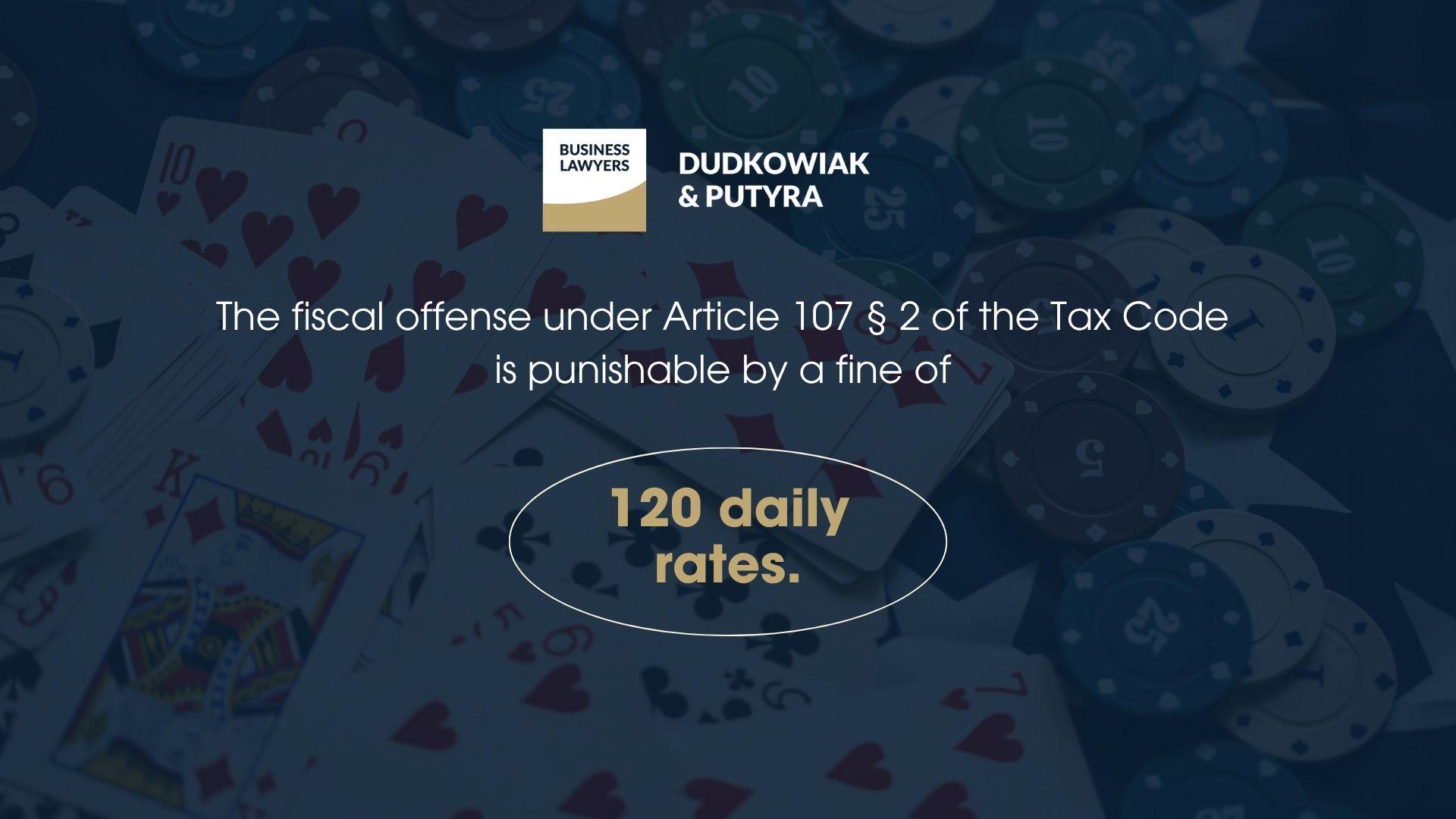
Significantly, for the commission of this offense, it is not important whether there was a tax loss for the state.
What is the penalty for participating in illegal games or online betting in Poland?
Participation in an illegal gambling game, arranged or conducted in violation of the Act or the terms of a license or permit, constitutes a separate fiscal offense under Article 109 of the Fiscal Penal Code.
However, the perpetrator of this act must be aware that he or she is participating in a gambling game that is conducted without a license, without a concession or in violation of the Act or in violation of the terms of the license or permit granted.
The offense of participating in illegal games or betting is punishable by a fine of up to 120 daily rates. Forfeiture may also be imposed as to winnings obtained from illegal games.
What is the penalty for violating the ban on gambling advertising and promotion in Poland?
Advertising, promoting or encouraging participation in illegal gambling is also a crime.
The fiscal offense under Article 110a § 1 of the Fiscal Penal Code consists of commissioning or conducting advertising or promotion of cylindrical games, card games, dice games, pari-mutuel betting or slot machine games, and placing advertising of such games and betting or informing of sponsorship by an entity operating such games or betting in violation of the Act.
This act is punishable by a fine of up to 720 daily rates.
In turn, the fiscal offense under Article 110a § 1 of the Fiscal Penal Code consists in profiting from the advertising or promotion of cylindrical games, card games, dice games, pari-mutuel betting or slot machine games, commissioned or conducted in violation of the Act, from the placement of advertising in violation of the Act, or from informing about sponsorship by an entity operating such games or betting.
The act is punishable by a fine of up to 720 daily rates.
Minimum Age for Gambling in Poland
Organizing or allowing persons under the age of 18 to participate in gambling games is strictly prohibited.
According to Article 110b of the Fiscal Penal Code, whoever allows a person under the age of 18 to participate in a gambling game other than a promotional or fantasy lottery is subject to a fine for a fiscal offense.
Administrative Fines in Polish Gambling Law: Who Can Be Penalized and Why?
It should be emphasized that regardless of the penalties provided for under the Fiscal Penal Code, it is also possible to impose a fine of an administrative nature, including, in particular, for:
- organizing gambling games without a license, without a permit or without making the required notification,
- organizing gambling games on the basis of a granted license, granted permit or made notification, who violates the terms of the approved regulations, granted license, granted permit or made notification, or conducts games on gaming machines, a drawing device or gaming devices without the required registration of the gaming machine, drawing device or gaming device.
Detailed information on obtaining licenses and permits is available here.
Administrative fines may be imposed not only on the organizer of illegal gambling games but also on the owner of the premises where unregistered gaming machines are located, payment service providers, participants in a gambling game arranged without a license, without a permit or without a notification.
Administrative fines are imposed by decision by the competent head of the customs and tax office. Such a decision can be appealed within 14 days, and then also referred to an administrative court.
Summary – Gambling industry in Poland
Gambling in Poland is strictly regulated, and illegal gambling activities – both by organizers and participants – are subject to severe criminal and administrative sanctions.
Legally operating a gambling business requires meeting a number of requirements, such as obtaining a license, complying with tax regulations and ensuring adequate control. In the context of online gambling, state authorities effectively block illegal activities, and advertising such services is also punishable.
In Poland, state control over the area of gambling organization is very strict. The state has a legitimate interest in monitoring and regulating the gambling market, not only because of the financial benefits, but also because of the threat of gambling addiction, especially to minors.
The most commonly adjudicated punishment for gambling-related offenses is a fine. Often, however, there is an accumulation of fines with administrative fines, resulting in great financial distress.
At the same time, it should be remembered that both the penalty imposed for a fiscal offense and administrative fines can be appealed, and the party accused of a fiscal offense has the right to a defense.
How can we help?
Our specialists can help you already at the stage of planning to organize legal gambling and obtain the appropriate concessions, licenses or permits, and can assess and analyze whether the offered content and games contain gambling character.
At the stage of criminal or criminal- fiscal and administrative proceedings related to the conduct of gambling activities, our specialists will help guide you through the entire process, prepare you for a hearing and file all possible appeals against the sanctions applied, such as objection, appeal or complaint – so as to minimize the risk and the amount of potential sanctions.
FAQ – Gambling in Poland
Who supervises gambling operations in the Polish gambling market?
Gambling activities in Poland are regulated under national gambling regulations. The Ministry of Finance and the National Revenue Administration oversee enforcement, licensing, and compliance, including activities related to online casino games, promotion lottery,
Are gambling games subject to gambling tax in Poland?
Under the Act, gambling tax applies to various games organised, including casino games, raffle bingo game, poker tournaments, online casino games, and sports betting. The applicable tax rates depend on the game type. For example:
- Cash lotteries – 15%
- Number games – 20%
- Cash bingo, telebingo, audiotex lotteries, and poker tournament (i.e., poker played in tournament form) – 25%
- Games on slot machines, cylinder games, dice games, and card games (excluding tournament poker) – 50%
These rates apply to the respective taxable bases defined by law, such as the total stakes or the difference between stakes and winnings.
Is a gambling license required to conduct gambling activities in Poland?
Yes. Conducting gambling activities in Poland requires a valid gambling license issued by the Ministry of Finance. Any gambling carried out without such a license constitutes unlicensed gambling, which is illegal under Polish gambling regulations. This applies to both traditional gambling and virtual events, including online casinos, poker tournament platforms, and unauthorized gambling casino operations.
What legal forms are allowed to organise gambling games in Poland?
According to Polish law, only specific entities may legally organise gambling games. These include limited liability companies and joint stock companies whose registered offices are in Poland. Additionally, companies established in a Member State of the European Union or the European Free Trade Association (EFTA) may operate under the same rules if they establish a branch or appoint a representative in Poland.
Is there a state monopoly over certain gambling activities in Poland?
Yes. The Polish state monopoly applies to number games, cash lotteries, telebingo games, and slot machine games performed outside of casinos. These may only be operated by the state-controlled entity and not by private sports betting operators or legal online casino providers.
What is the role of the company’s management board in gambling licensing?
The company’s management board, supervisory board, and board or audit committee are subject to strict vetting during the gambling license process. Members must have EU or EFTA citizenship, no pending proceedings related to counteracting money laundering, and an impeccable reputation. The structure must comply with transparency and security standards established under Polish law.
Can betting be offered online and at betting shops?
Yes. Licensed operators may offer online betting via approved websites or operate physical betting shops and betting points. Each outlet must be registered, and online activities require submission of technical documentation, including secure systems for verifying age and protecting bet integrity.

